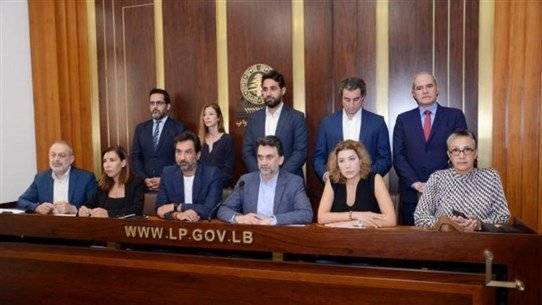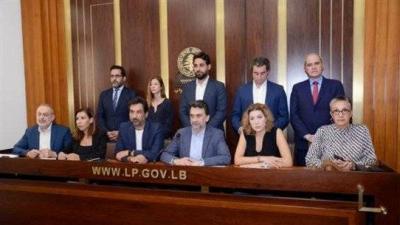Members of the "Change Forces" bloc face difficult choices after the political crisis affecting the bloc became evident in the last parliamentary session, which was dedicated to the election of the council office members and parliamentary committees. The options for reconciling and addressing the crisis are limited to responding to the efforts made by their colleagues, Paula Yacoubian and Melhem Khalaf, in a possibly final attempt to maintain the bloc's unity. However, their task will not be easy due to some stubborn members, and if those positions persist, the only option may be to announce a split.
Yacoubian and Khalaf have taken it upon themselves to play a mediating role among their fellow MPs, initiating moves to prevent the looming split and potentially establishing a "friendly divorce" if they cannot revert matters to order. This would involve maintaining a minimum coordination and consultation level on major issues, the most significant being the election of a president for the republic.
Those who think, according to sources within the bloc, that the disagreement stems solely from the varied positions expressed during the last parliamentary session are mistaken. The core issues are rooted in a series of political and organizational topics that have been escalating due to the lack of solutions.
Sources highlight that the bloc did not enter the session with a unified stance on electing members for the parliamentary committees and the council office. Although some MPs had previously conducted discussions leading to an agreement that there would be no parliamentary opposition to the bloc's members joining the committees, this was contingent upon not running for the council office. It is emphasized that the failure of this understanding led to their exclusion from the committees, contradicting the notion that Marc Dahou's candidacy for the finance committee alongside his colleague Ibrahim Mneimneh was the cause of publicized internal conflict since they were supposed to run together.
The bloc has struggled from the very first day of the parliamentary elections due to a malfunction complicating its effectiveness both politically and within parliament, stemming from a failure to agree on a decision-making mechanism. While the prevailing opinion within the bloc calls for consensus-based decision-making, there is a counter-argument demanding a vote if consensus cannot be achieved, causing a stalemate preventing effective parliamentary and political participation.
The sources indicate that Khalaf, in cooperation with Yacoubian, is attempting to postpone the disagreement over the decision-making approach, hoping that the minority opposing voting will reconsider their stance to pull the bloc out of its self-imposed paralysis. The conflict during the session was merely the last straw.
Additionally, a limited faction within the bloc's insistence on vilifying the "March 14 Forces" encountered strong opposition from the majority, driven not by defense of the parties formed from it but by respect for the vast majority of the Cedar Revolution's supporters and the blood of its martyrs. The sources reveal that one of the bloc's sessions involved a political confrontation between MPs Michel Douaihy and Halimeh Kaakour concerning her failure to differentiate in her campaign between the responsibility of parties and the fallen, including Samir Kassir and Gibran Tueni.
Furthermore, some Members of Parliament have remained resolute in their positions to the point of avoiding engagement with parliamentary blocs that share common grounds with them. They also approach the presidential election from opposing viewpoints, despite having initially agreed to present a list of candidates, including former MP Salah Hnein and former ministers Nasif Hitti and Ziad Baroud. However, the surprise came when a minority of bloc members opposed Hnein's candidacy, despite having initially agreed to include his name.
Moreover, in a bid to prevent division within the bloc, the decision to nominate Selim Michel Edde was taken as an initiative from Khalaf, who reached out to him for this purpose, even though Edde was not particularly enthusiastic about being nominated. He ultimately had to make a decision to vote on a paper in the second election session that did not occur due to a lack of quorum.
Thus, it is essential to support Yacoubian's and Khalaf's efforts to clear the air within the bloc ahead of the presidential election session, hoping they can contain the disagreement before it escalates in light of Douaihy's withdrawal from the bloc, expressing full readiness to consult with his colleagues.
Will Yacoubian succeed in her mission alongside Khalaf to prevent a split at least in the near future, enabling their colleagues to enter the election session, if it is held, with a unified stance? What about the "political chemistry" missing between the majority and the minority led by Mneimneh and Kaakour, along with Santia Zarazir and Firas Hamdan? What about the exchange of accusations regarding some members resorting to establishing their own communications channels separate from the bloc, particularly with "Hezbollah"?




